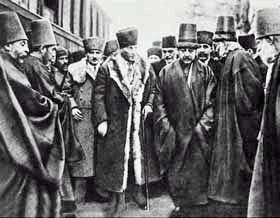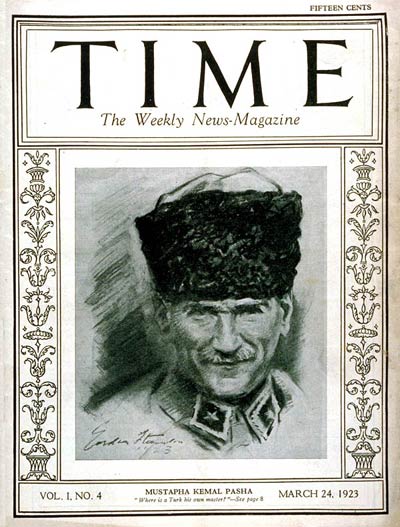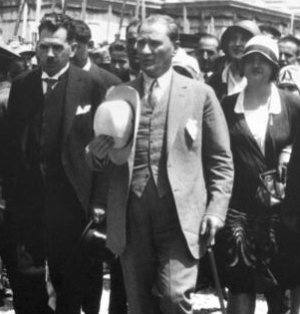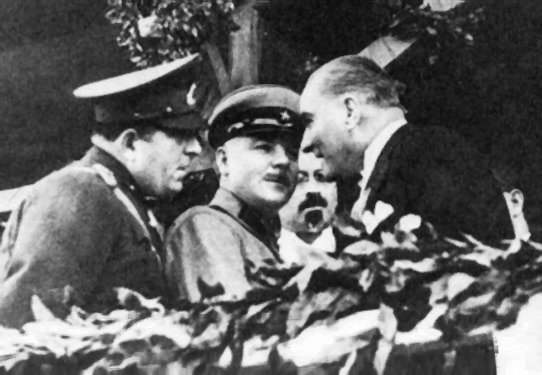I’m very late with part three of this short Turkish history briefing, especially because I was busy with things more trendy, like rising money for charitable reasons or chatting on Twitter, and because I was very confused on talking objectively about this chapter, which is mostly about the creator of the Turkish modern state, Mustafa Kemal Atatürk. I’m not going to repeat when he was born, I’m telling you that he was born in Salonika, Ottoman Empire, actually Thessaloniki, Greece. A thing the Turks will never recognize, is that he was Dönmeh (Turkish: dönme) member of a group of crypto-Jews in the Ottoman Empire and present-day Turkey who openly affiliated with Islam and secretly practiced a form of Judaism called Sabbateanism (according to Encyclopaedia Judaica).
According to Time Magazine, Mustafa Kemal’s father was of Albanian and his mother was of Macedonian origin, and Patrick Kinross wrote that he was “as fair as any Slav from beyond the Bulgarian frontier” with “fine white skin” and “eyes of a deep but clear light blue.” Let’s say that it is of no importance his religious belief either, he was a power avid guy, spoiled by his mother up to the point that he won’t go to school anymore, he fought against any kind of authority and was openly insolent and abusive to his teachers. An uncle suggested sending him to the military cadet school in Salonika and making a soldier of him. Since it was subsidized by the government, it would cost them nothing, if the boy demonstrated ability, he would become an officer. He was brilliant. He graduated in 1905 with the rank of Captain. A teacher gave him the name “Kemal” which means “perfection”, “maturity”.
He enrolled in a subversive society, named Vatan – The Fatherland – who’s objectives were to oust the legitimate Sultan and replace him by a Western-styled government complete with Constitution and parliament, destroy the authority of the ulema or religious scholars, and abolish purdah and the veil, declaring absolute equality between men and women. Soon Mustafa Kemal became its chief. The opportunity for extending his influence finally came when, just before the ousting of Sultan Abdul Hamid in 1908 by the Young Turks, its ruling party, The Committee of Union and Progress invited him to join them. For the next ten years he distinguished himself in the military profession as he was a born soldier and leader. Gradually, he assumed more and more political influence.

In 1923, with members of the Mevlana order before its institutional expression became illegal and their dervish lodge changed into the Mevlana Museum. The Mevlevi order managed to transform itself into a nonpolitical organization which still exists. - from Wikipedia
He spent his evenings in secret meetings behind locked doors planning for the coup d’etat which would give him absolute dictatorial power. His opportunity arose when at the end of the First World War, he took the lead in defending the territorial integrity of Turkey against the combined European powers who were intent upon dismembering “the sick man of Europe”. By thwarting these designs and whipping up the enthusiasm of the populace to fight to the death for their country, Mustafa Kemal Pasha became a national hero. When the Greeks were defeated and Turkey’s victory assured, the Turkish people went delirious with joy. They hailed him as their Saviour and bestowed upon him the honorific title Ghazi or “Defender of the Faith”.
“For nearly five hundred years, these rules and theories of an Arab Shaikh and the interpretations of generations of lazy and good-for-nothing priests have decided the civil and criminal law of Turkey. They have decided the form of the Constitution, the details of the lives of each Turk, his food, his hours of rising and sleeping the shape of his clothes, the routine of the midwife who produced his children, what he learned in his schools, his customs, his thoughts – even his most intimate habits. Islam – this theology of an immoral Arab – is a dead thing. Possibly it might have suited tribes in the desert. It is no good for modern, progressive state. God’s revelation! There is no God! These are only the chains by which the priests and bad rulers bound the people down. A ruler who needs religion is a weakling. No weaklings should rule!” (not learned in Turkish schools, excerpts from the tons of Atatürk’s speeches)
The preamble of the new (Turkish) Constitution speaks of full dedication to the reforms of Atatürk. Article 153 prohibits any retrogression from these reforms: The law of the unification (and secularization) of education, the Hat Law, the law on the closing down of dervish convents and mausoleums and the abolition of the office of keepers of tombs and the law on the abolition and prohibition of certain titles, the conduct of the act of (civil) marriage, the law concerning the adoption of international numerals, the law concerning the adoption and application, of (the Latin letters for) the Turkish alphabet (and the banning of the Arabic script), the law on the abolition of titles and appellations such as Efendi, Bey or Pasha, the law concerning the prohibition against the wearing of (indigenous) garments.
During the period these reforms were being enforced, Mustafa Kemal Pasha married an European-educated lady named Latifa, who, during the struggle for Turkey’s independence, was encouraged by him to dress like a man and demand for women absolute equality. But the moment she grew self-assertive and insisted upon being treated as a respectable wife, he furiously divorced her, and sent her away. The irony was that earlier, Kemal was responsible for annulling the Islamic form of divorce, and yet he pronounced the talaaq when he divorced his wife. A few months after his divorce, the anullment of the Islamic divorce was lifted. After his divorce from Latifa, he drank so heavily that he became a confirmed alcoholic. Venereal disease wrecked his health. Handsome young boys became objects of his lust and so aggressive was his behaviour toward the wives and daughters of his political supporters that they began sending their womenfolk as far as possible out of his reach. And since no dictator can tolerate any rivals, Mustafa Kemal Pasha lost no opportunity in crushing all political opposition.
The secret police did their work. By torture, by any means they liked, the police had to get enough evidence to incriminate the opposition leaders who were all arrested. A Tribunal of Independence was nominated to try them. Without bothering about procedure or evidence, the court sentenced them to be hanged. The death warrants were sent to Mustafa Kemal for his signature in his house at Çankaya. Among the death warrants was one for Arif who, after a quarrel with Mustafa Kemal, had joined the opposition. Arif, his one friend, who had stood loyal beside him throughout all the black days of the War for Independence – the only man to whom he had opened his heart and shown himself intimately. One who was there reported that when he came to this warrant the Ghazi’s gray mask of a face never changed; he made no remark; he did not hesitate. He was smoking. He laid the cigarette across the edge of the ash-tray, signed the death warrant of Arif as if it had been some ordinary routine paper and passed on to the next…. He would do the thing properly. He would give a ball at Çankaya that night also.
– fragment from H. C. Armstrong – The Grey Wolf
Mustafa Kemal was now absolute Dictator. The Turkish people accepted such anti-Islamic reforms as the banning of the fez and turban, compulsory wearing of Western clothing, the Latin alphabet, the Christian calendar and Sunday as legal holiday, only at a dagger’s point. Nothing can be further from the truth than the delusion that the Turkish people wanted any of this. In 1932 Mustafa Kemal decreed that every Turk must adopt a family name as it is customary in Europe and America. He chose for himself Atatürk, which means “The Father of the Turks”. Six years later, his health completely ruined, he died of cirrhosis of the liver.
What The Father of the Turks achieved, was an independent Turkey on the European arena. Controversial, he signed finally a lot of paperwork, which is not putting the Turks quite on the white light of Europe, left them without oil after the “Mossul Controversy”, fought against Britain with Bolshevik money (5 Million Golden Lira), stirred everyone against everyone, and now, the poor fellows quite have the illusion they are Ombelico del Mundo, a race descendant from the Sun. But they’re fine, they fought, and fought, and they have that fatalistic view of fate without fate. They leaved only the claimed national territories, as Serbia, Greece, whatever, they were left even so with a very fine positioned land, with openness to four Seas, with controlled Straits of Bosporus and the Dardanelles, with a magnificent city with sides on two continents. They are Muslims but they’re not, they have lost the control but they still keep it, they don’t actually know exactly what they want. Their Parliament, is with the eyes to the USA. They have powerful Elite members there, in Turkey, they know how to manipulate, they are good.
I’m going to publish one more post, about post-Atatürk era, and that will be for the moment. I shall say more of Turkey in my Travel section of this blog. Thank you for passing by, now and then, 🙂
If you liked what you read (and for that I humbly thank you for your patience), subscribe to this blog by Email! Follow this blog on Twitter, and on Facebook! For a joyous day, check out my pins on Pinterest or my grams on Instagram 😄. I hope you like this blog so much that you think it’s time to take a step further by becoming yourself a blogger; in order to do that have the kindness to read the Own Your Website offer I have prepared for you! You won’t regret. Thanks for passing by 😄 Speak your mind, don’t be shy!
Copyright © 2011 Rodolfo Grimaldi Blog – Turkish Politics 3



